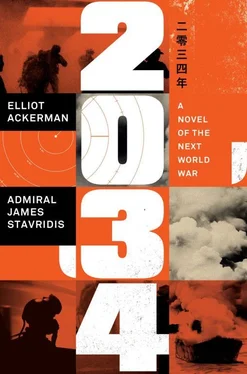The message was hardly a message, simply four latitudinal and longitudinal coordinates, so a box. There was no mission statement, no situation update; Hunt would place the Enterprise and its escorts within this box and then await further instructions. She tucked the scrap of paper in the pocket of her coveralls. As she went to leave, Quint stopped her. “Ma’am,” he said, reaching onto a back shelf. “We fixed this up; thought you might be able to use it.” In his large grip was an old travel radio. “If you tune it just right, you can get the BBC World Service, even a bit of music, depending on where we’re at. The dial is a bit tricky. It takes some finesse. But it should do all right for you.”
Quint and Hooper were still playing around with the HF receiver as she left, Quint making motions with his hands, Hooper manipulating the dial. With the decoded message in her pocket, Hunt bounded up the four levels to her stateroom. She set the slip of paper with the coordinates on her desk, already layered with an assortment of nautical charts. With a set of parallel rulers, a divider, a compass, and a sharp pencil, she sketched out the corners of the box. It was tight, but large enough to fit her carrier strike group. It was to the south of their current position, another eighty nautical miles further off the coast, a three-hundred-mile straight line overwater to Zhanjiang, the headquarters of China’s South Sea Fleet. With the crisis around Taiwan, she wondered how many of the South Sea Fleet’s ships were currently in port.
It wouldn’t be many.
But it would be enough.
Hunt set her pencil down on the chart. She turned on the radio and managed to find the BBC World Service. With her arms crossed and her legs stretched out in front of her, she closed her eyes and relaxed. She tried to imagine the news reports— USS Enterprise strikes Chinese naval facility with tactical nuclear weapons —but she couldn’t; it seemed too improbable. Although few Cold War precepts had aged well in the twenty-first century, the logic of mutually assured destruction was one of them. Even so, thought Hunt, her country had little to gain by wiping out the port at Zhanjiang. As she prepared to alter the course of the Enterprise , she couldn’t help but recognize this maneuver for the theater it was—for the theater such maneuvers always had been—ever since man split the atom, unleashed its power, and nations coerced one another with the threat of that power. The current crisis would de-escalate, as crises always did. She felt certain of this.
That certainty gave her some peace of mind, enough so she dozed off in her chair. She slept dreamlessly, waking an hour later. Her radio was no longer playing the BBC World Service. It had lost the signal. All it emitted was static. Hunt fiddled with the dial, trying to retune into the news.
Then she heard something.
A weak, indistinct voice.
As quickly as she heard it, it disappeared.
She left her radio tuned to the static, set on the same frequency, wondering if she might hear the strange transmission again. She knew what it was; Quint had told her.
It was ghosts.

14:22 June 24, 2034 (GMT+2)
Barents Sea
This far north the sun held above them nearly twenty-four hours a day. The sky was clear, the weather unseasonably warm. The American fleet was nowhere to be found; it had sailed away. The Russian Federation owned these waters, and they knew it. Unencumbered by the looming threat of the US Navy, the crew of the Rezkiy and other ships of the flotilla indulged in bouts of recreation. On the battle cruiser Pyotr Velikiy , the crew descended its side boats to take plunges into the icy seawater. On the carrier Kuznetsov , the captain authorized sunbathing on the flight deck despite the cold. On the smaller Rezkiy , Kolchak allowed pop songs to play over the ship’s intercom during the daily cleanup; most popular were classics like Elvis, the Jonas Brothers, and anything by Shakira. “Hips Don’t Lie” was a favorite.
These little breaks with discipline, plus the general eccentricity of naval life, confounded Lieutenant Commander Farshad. His liaison duties consisted of little more than being a presence that evidenced two nations’ faithfulness to one another, even though neither of those nations had ever been renowned for faithfulness to anything but themselves. Farshad had once said as much in the wardroom to Kolchak, who had asked in reply, “Has a nation ever been faithful to anything but itself?” Farshad had conceded the point.
Not long after this exchange, Farshad had been standing on the bridge of the Rezkiy when the watch spotted a school of sharks off the ship’s port side. Kolchak had been manning that watch and he took an uncanny interest in the sharks, even adjusting their ship’s course to follow them for several minutes. “Perfect,” said Kolchak as he stared at their thrashing dorsal fins. As if sensing Farshad’s confusion, he explained himself. “Those sharks are heading in the direction of the 10G undersea cables. They’re attracted to the electromagnetic energy. Those cables connect to the United States, and sharks have been known to chew through them. Their presence will give us deniability.”
Destroying a few of the undersea cables would send a powerful message to the Americans, slowing internet across the country by as much as 60 percent, or so Farshad had been told by Kolchak. This might be enough to de-escalate the crisis, to bring everyone to their senses. When it came to acting pragmatically, which was to say acting in their national interests, it seemed to Farshad that only his country—and perhaps the Russians—were capable of clear thinking. The Russians, like them, knew that any scenario that weakened the Americans was advantageous. In fact, a de-escalation of the current crisis wasn’t really in the Iranian or Russian interest.
Disruption was in their interest.
Chaos.
A change in the world order.
The sharks disappeared beneath the waves, and for the remaining hours of the day the Rezkiy and its sister ships idled over the 10G cables. The mood on the ship turned businesslike. Farshad lingered on the bridge, where Kolchak and the captain kept a vigil, the two speaking exclusively in Russian, while Kolchak took the occasional break to explain the situation to Farshad.
“We’ll circle around this area here,” Kolchak said, pushing a yellowing fingernail at their navigation computer’s interface. “The Pyotr Velikiy has a tethered submersible aboard that is going to place an explosive cutting charge on the cables.”
“How large is the charge?” asked Farshad.
The captain brought his eyes out of his binoculars. From over his shoulder, he glanced at them warily.
“Just enough to do the job,” said Kolchak.
The captain made a face, and then a transmission came over the radio in Russian. Kolchak snatched the receiver and promptly replied while the captain dipped his eyes back into his binoculars and continued to scan the open sea. The Pyotr Velikiy was recovering its submersible, the charge having been set. Planted on the horizon was the Kuznetsov , its decks crowded with aircraft. Kolchak continued to check his watch, the second hand making its steady orbit around the dial as they waited.
More minutes passed in silence.
Then an explosion, a geyser fountaining upward from the seabed. Followed by a shock. And a sound, like a clap. The entire ship rattled. The water splashed back onto the surface of the ocean. Another radio transmission came into the bridge. The voice was excited, congratulatory. The captain answered the call in the same congratulatory manner. The only person on the bridge who didn’t seem pleased by the result was Farshad, who was confused. Grasping Kolchak by the elbow, he said, “That must’ve destroyed more than one or two cables.”
Читать дальше













